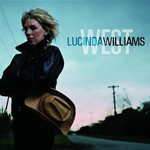West
Studio Album by Lucinda Williams released in 2007Are You Alright? | |
Mama You Sweet | |
Learning How to Live | |
Fancy Funeral | |
Unsuffer Me | |
Everything Has Changed | |
Come On | |
Where Is My Love? | |
Rescue | |
What If | |
Wrap My Head Around That | |
Words | |
West |
West review
Today Lucinda Williams is a different artist
Lucinda Williams today is a different artist from the one whose disgracefully belated commercial breakthrough came with Car Wheels on a Gravel Road in 1998. That Lucinda had released four albums of her own songs on four labels in eighteen years all of which, back to 1980's girlish, strummed-acoustic Happy Woman Blues, favored concrete narrative and verse-chorus structures. This Lucinda has released three studio albums plus a redundant live double in six years, all of which tend toward metaphysical abstraction and open-ended incantation. She employes structural quirks eccentric repetitions and digressions, purposefully monotone melodies, talking-blues read: bad rap) delivery, unjustified song lengths like defense mechanisms, keeping listeners from digging too deeply into her songs or identifying too strongly with her. This time she seems to be writing to keep people out, fortressing herself against audience expectations. With her divisive vocals and incisive lyrics, it's easy, maybe too easy, to regard the singer as indistinguishable from her songs' characters. But she asks for it. Despite her reputation for being lonesome, orn'ry, and mean, the ease with which she expresses herself in country songwriting fueled her legend even when she took nearly a decade between albums.
West's songs are quiet, lazy, but full of emotions
The opener, Are You Alright? is one of her greatest songs ever, riding a deep, lazy groove and keyed to a title refrain. Another West's highlight is Unsuffer Me - a desperate, agonising epic in which she pleads to a lover or some higher force to make her happy. That song, along with a few others here, features strings arranged by violinist Jenny Scheinman, brought onto the album by producer Hal Winter. The strings are beautiful, adding texture and timeless yearning to already delicate arrangements. One more song that should be noticed is Fancy Funeral. It warns against honoring the dead too much, and in its description of an overly lush ceremony, the old Lucinda emerges, but the song's concerns are so pecuniary that buyer's remorse overshadows any actual grief. Learning How to Live, Where is My Love and What If are mid-tempo ballads that find Williams coping with separation while discovering herself and her inner strength, even while questioning everything she thought she knew. Her anger percolates in the barroom blues and double entendres of Come On and the nine-minute jam, Wrap My Head Around That. But the track that confronts all this hardship, loss and emotion most powerfully is the album's centerpiece, Rescue, an ethereal, bluesy exploration into redemption and solace.
West attests to the Lucinda's growth through a tumultuous period in her life
The 50-something Lucinda Williams is a very special talent. A wonderfully gifted and honest songwriter with an ability to cross genres from the blues to folk and from country to soul and still fuse it into one deeply satisfying and moving whole. The tearstained songs on West attest to the singer's growth through a tumultuous period in her life. From the first forlorn chorus of opener Are You Alright?, it is clear that these last four years have been just as difficult for Lucinda as they have been for her patient fans. West is written in the aftermath of a tempestuous relationship, the death of her mother, and a move to Los Angeles. West has already become her most praised LP. Although the songs themselves speak to the depth and breadth of Lucinda's talent amid turmoil, others haven't shied away from heaping their own words of praise upon her. A review from Entertainment Weekly exclaims, "Combining her rich voice with gut-wrenching lyrics, Williams triumphantly returns. Lucinda writes about lust, love, and loss like nobody else," says Vanity Fair. It's still the same old Lucinda - voice, words, and guitar - but now with a sound that befits a new time and place in her life, one as panoramic as the vistas of the Old West.

